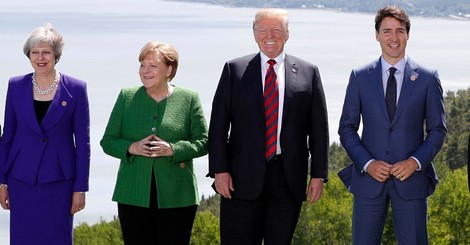Your podcast discovery platform
Curious minds select the most fascinating podcasts from around the world. Discover hand-piqd audio recommendations on your favorite topics.

piqer for: Globalization and politics Global finds Climate and Environment
Javier is a Berlin-based multimedia journalist. He completed a MA in International Journalism at City, University of London and is focused on humanitarian and conflict issues.
With experience in several countries, he's covered the refugee crisis, Turkey's coup attempt and the Kurdish conflict.
Among others, his work has been published at ABC News, Al Jazeera, Channel NewsAsia, RBB, IRIN News, El Confidencial, Público or Diario ABC.
NATO Crisis Also Existed Before Trump
We are used to reading news and analysis about the existential threat Donald Trump represents for the western alliance and the current world order.
Of course, the situation is further complicated when the US President describes the EU as a "foe" and verbally attacks Germany at a NATO summit.
But it isn't at all the first time after WWII the western block sees infighting.
Richard Fontaine and Vance Serchuk go through some of these episodes in an article for The Atlantic.
Almost as if by clockwork, a serious breach has tended to flare up between the United States and its European allies every 15 to 20 years going back to the mid-1950s—inspiring fears of a broader, more enduring unraveling of the alliance.
It started quite early, only 11 years after Hitler was defeated and the whole world divided into two blocks. The US aligned in the UN with the Soviet Union to stop the attempt by Britain and France (alongside Israel) to seize control of the Suez Canal from Egypt.
Tensions among NATO members, especially between European countries and the US also took place over the Vietnam War, Willy Brandt's Ostpolitik, Reagan's deployment of missiles in West Germany and the Iraq War.
We might look at those events from our perspective and find them not so dangerous as Trump's ideas, comments and behaviour—that isn't how those episodes were seen back then.
During many of these crises, foreign-policy thinkers warned that the disagreements were the product of more than just an unfortunate misalignment of interests or an unlucky combination of leaders with conflicting worldviews. Rather, they insisted, there were structural, tectonic forces at play that threatened a common Western future.
There's little doubt Donald Trump has brought a lot of uncertainty to the future of the West as we understand it today. However, at the end of the day the United States and the European Union continue to need each other in terms of trade and geopolitical interests.
